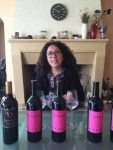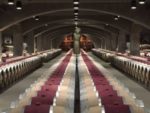Mura Mura, a new winery in Monferrato area, have hosted a special and international convention last November 5.
Starting by the point the world of wine can’t be decisive to sort out the problems caused by climate change, this conference enhances the importance of wineries and human behaviours may actually have. Illustrious characters of the world wine sector have told their efforts to set up sustainable agriculture before then organic or biodynamic. Among the speakers, Carlin Petrini (fondatore di Slow Food), Aubert de Villaine (Domaine de la Romanée Conti), José Vouillamoz (Académie Internationale du Vin), Alessio Planeta (Planeta), Willi Bründlmayer (Weingut Bründlmayer), Carlo Mondavi (Raen) and Alvaro Palacios (Bodega Alvaro Palacios), Mario Pojer, Saskia De Rotschild (Château Lafite), Thomas Duroux (Château Palmer), and Jean-Pierre Perrin (Château de Beaucastel).
In this period researcher are studying new varieties, hybrids or other resistant grapes able to reach several levels of resistance. They are looking for ancient native grapes which have overcome even the medieval crisis and display themselves enough elastic. Moreover, important factors are the rootstock selection whose test which seen how is functional plant those varieties able to adapt to the soils. Carlin Petrini has shown the reality which we are and must face to: our planet still be at the turn of the industrial development revolution. We have reached the point of no return, everyone must do their part,a paradigm shift is expected involving the way of travelling, producing and consuming. There are three points we need to focus on: new and good
practices in agriculture that take into consideration the reduction of agricultural products derived from carbon, reduce plastic and overbuilding, in order to protect the soils and guarantee biodiversity. Certainly – concluded Petrini – wine has
restored the proper dignity to the peasant world. Among the speeches, Aubert de Villaine, said the Domaine is in the front line to study and contrast climate change; for instance, chardonnay is friendly with the sun. He believes there is no need to plant other varieties but it is better expect a cultivar adaption passing through the changing agriculture practice and the time of pick. In the Langhe region, Elio Altare said that «We must learn to understand and manage the quality of water in order not to have dehydration and sugar accumulation. . I recorded 32 harvests off 56, my experiences are all based on the work I do in vineyards.» In Bordeaux region, to contrast climate change, two appellations have obtained approval for experimental use of six ‘new’ varieties even Touriga Nacional. The more and more turbulent climatic episodes like hailstorms and frost have
caused, and not only in this part of France, a lower of production for the third year consecutive. In this context Saskia De Rotschild (Château Lafite) showed the goal she is thrilled to reach within 2030 likewise introducing hedges and small parts of wood by uprooting three hectares of vines. A sacrifice to endorse the biodiversity and the fauna to morph the existing habitat into a new one. A collection of shares followed by a special wine tasting where guests have had the chance to taste the difference among harvest hotter or cooler; our memorable sips were: Echézéaux 2005 (Domaine de la Romanée Conti), Château Palmer 2008, Bricco dell’Uccellone 2010 (Braida), Cuvée Annamaria Clementi 1996 (Ca’ del Bosco), Cepparello 2014 (Isole e Olena),Clos Saint-Denis 2008 (Domaine Dujac).
by Erika Montovan




